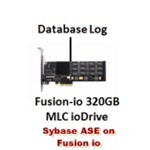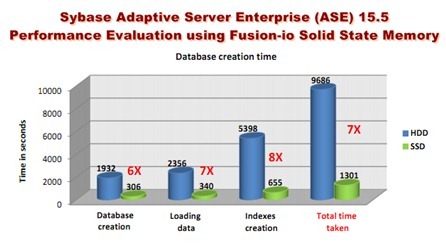SSD offers low I/O latency, a superior read and write bandwidth and IOPS when compared to HDD. Higher throughput in terms of transactions per minute is observed when SSD is the choice of storage device for ASE. The metric for performance comparison however depends also on overall system price. Since the price difference in terms of $/GB comparing SSD and HDD is still significantly high, the tradeoff between performance gain versus price ratio has to be evaluated in details to ensure overall positive gain from the SSD adoption.
With respect to the OLTP benchmark that we ran during our evaluation of SSD usage in the ASE environment we have the following conclusions:
Using an all SSD device speeds up the operational scalability by up to 7X when compared to an all HDD setup.
SSD usage for database backup and recovery reduced the operation time by up to 5X
Using SSD for a log-only device in optimal ASE configuration, increases throughput by 1.65X
including both data and logging in SSD with an optimal configuration, increases throughput up to 1.81X
In a system experiencing data growth, when cache sizes are insufficient to store most hot tables and indexes, moving all data and logging to an SSD device increases performance throughput up to 13X
When CPU utilization is high (>90%), using an SSD setup does not increase the performance. SSD gives a performance boost when I/O is determined to be the primary bottleneck.
For Details Sybase-ASE15.5-Fusion-io-WP.pdf




Yo , I am making a new blog and I think your articles would fit the context good. Am I allowed to link back to this article?
Great blog, how about links exchanging? Please contact me asap, Thanks.
Is it ok if I quote your article on my Wiki Site? I think your topic suits my audience perfectly. Uhmmm, thanks for posting this.
Hello this is amazing site! really cool and it will be a new inspirations for me
You should take part in a contest for one of the most useful websites on the internet. I will highly recommend this site!